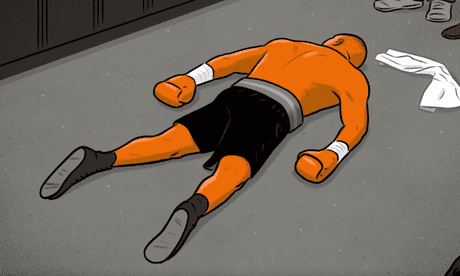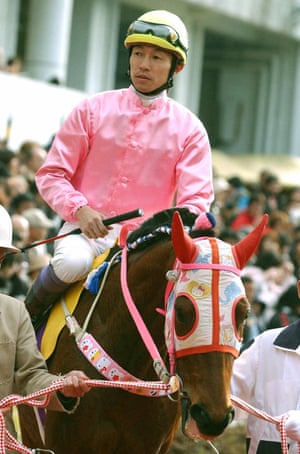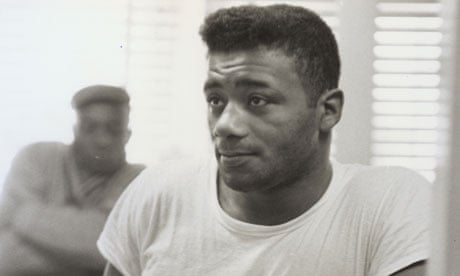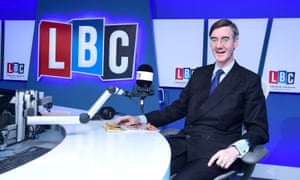They say that you find the best stories in the loser’s dressing room but discovering what defeat does to a champion is not easy topic to tackle writes Andy Bull in The Guardian
There are all different sorts of pauses, and in this business the worst is the one that starts every loser’s press conference, which sometimes drags on so long you worry it’ll never end. A winner’s press conference will fly by, but the ones held by the other guy feel sort of awkward. They usually start with some inoffensive and open-ended bromide, “how are you feeling?” or “you must be disappointed?”, a painkilling platitude before we start to probe a little deeper in the wound. Or everyone will latch on to some ready explanation for what went wrong, the referee’s decision, or someone else’s poor sportsmanship, grateful for an opening that avoids the blunt confrontation of someone’s public failure.
They say that you find the best stories in the loser’s dressing room. No one is sure which grand old man of US journalism came up with that. Maybe it was Bill Heinz, maybe it was Jimmy Breslin, maybe it was Gay Talese. Sixty years later, Talese’s profile of heavyweight champion Floyd Patterson is still one of the most excruciatingly honest accounts of what defeat does to a champion athlete.

Winners are boring!
Because it’s not an easy topic to get at. “I’ve wanted so much to talk to another fighter about all this,” Patterson told Talese, “but who can you talk to? Most fighters don’t talk much anyway. And I can’t even look another fighter in the eye at a weigh-in.”
Talese opened Patterson up like a sardine tin. Patterson told him how he used to keep a fake beard, moustache, spare hat and glasses stashed in his kit bag, and how, when he lost to Sonny Liston in a first-round knockout, he put the disguise on right after the fight and wore it all the way from Chicago to New York, where he went straight to the airport. “I didn’t care what plane I boarded,” he said. “I just looked up and saw this sign at the terminal reading ‘Madrid’, and so I got on that flight after buying a ticket.”

Yutaka Take riding Haru Urara in Kochi, Japan. Photograph: Sports Nippon/Getty Images
For the next five days, Patterson pretended he was an old man with a limp. “I began to actually think I was somebody else,” he said. “And it is nice, every once in a while, being somebody else.”
Patterson was an Olympic champion at 17, won the heavyweight title once at 21, then again when he was 25, and altogether, from his first victory against Eddie Godbold at the St Nicholas Rink, and his last defeat against Muhammad Ali at Madison Square Garden, he fought 64 times, won 55, lost 8, drew 1.
And despite it all, he told Talese, he couldn’t ever shake the feeling that he was some sort of a coward. “You can be a fighter – and a winning fighter – and still be a coward,” Patterson said. That’s why he kept that disguise ready. “It’s easy to do anything in victory. It’s in defeat that a man reveals himself. In defeat I can’t face people. I haven’t the strength to say to people: ‘I did my best, I’m sorry.’”
Esquire called the piece The Loser, which was pretty damn provocative. Back at the beginning of this decade the British tennis player Robert Dee got headlines like that when he lost 54 consecutive matches in ITF/ATP events. The papers called him the worst tennis player in the world, and Dee got so annoyed that he spent the next year making everybody take back what they’d said about him, on the ground that he’d actually won a few matches in a domestic event in Spain.
Even now, Dee’s website reads like one long list of the retractions his lawyers extracted. He ended up taking the Daily Telegraph to the high court for libelbecause they wouldn’t back down. He lost. Fifty-five years later, Netflix has borrowed Talese’s title for its new documentary series, Losers, directed by Mickey Duzyj. There are some great stories, well told, among the eight he picked, such as the reluctant heavyweight Michael Bentt, who lost his world title in his very first defence, Surya Bonaly, the figure-skater who finished in second place at three successive world championships, and, inevitably, Jean van de Velde, who blew the Open on the 72nd hole.
It must have made an interesting pitch. “I’m making a show about losers and I’d like you to be in it.” Duzyj says he had “conversations” with most of the subjects before the launch, about why he’d picked such a pitiless title for the show. “Everybody gets it, mostly because of the tone with which we explored their stories.”

Floyd Patterson, the sleeping giant of boxing
And there’s the catch. Because, good as the show is, the stories all have happy endings. Duzyj calls them “noble failures”. He got interested in the topic when he made a short documentary a couple of years back about a Japanese racehorse called Haru Urara, who lost 113 races in a row. Haru Urara became such a popular underdog that people bet more than $1m on his 100th race, which saved his home track from going bankrupt. “Given the ruthlessness of American culture and the surprising wisdom that came from the Japanese story,” Duzyj says: “I thought it’d be interesting to explore a series of international ‘noble failures’ and see what we all could learn from them.”
It feels like Duzyj flinched, that he felt he had to spin a little sugar in to sweeten the mix. But then when you’re talking to losers, maybe that’s the way it needs to be – and maybe, too, it’s the way we want to think it is. Like Patterson said: “I was the fighter who got knocked down the most, but I also got up the most.”
Be it Jacob Rees-Mogg or Nigel Farage, blusterers and braggarts are rewarded with platforms that distort our political debate writes George Monbiot in The Guardian

Jacob Rees-Mogg during his LBC radio phone-in programme, April 2018. Photograph: Ian West/PA
If our politics is becoming less rational, crueller and more divisive, this rule of public life is partly to blame: the more disgracefully you behave, the bigger the platform the media will give you. If you are caught lying, cheating, boasting or behaving like an idiot, you’ll be flooded with invitations to appear on current affairs programmes. If you play straight, don’t expect the phone to ring.
In an age of 24-hour news, declining ratings and intense competition, the commodity in greatest demand is noise. Never mind the content, never mind the facts: all that now counts is impact. A loudmouthed buffoon, already the object of public outrage, is a far more bankable asset than someone who knows what they’re talking about. So the biggest platforms are populated by blusterers and braggarts. The media is the mirror in which we see ourselves. With every glance, our self-image subtly changes.
When the BBC launched its new Scotland channel recently, someone had the bright idea of asking Mark Meechan – who calls himself Count Dankula – to appear on two of its discussion programmes. His sole claim to fame is being fined for circulating a video showing how he had trained his girlfriend’s dog to raise its paw in a Nazi salute when he shouted: “Sieg heil!” and “Gas the Jews”. The episodes had to be ditched after a storm of complaints. This could be seen as an embarrassment for the BBC. Or it could be seen as a triumph, as the channel attracted massive publicity a few days after its launch.
The best thing to have happened to the career of William Sitwell, the then-editor of Waitrose magazine, was the scandal he caused when he sent a highly unprofessional, juvenile email to a freelance journalist, Selene Nelson, who was pitching an article on vegan food. “How about a series on killing vegans, one by one. Ways to trap them? How to interrogate them properly? Expose their hypocrisy? Force-feed them meat,” he asked her. He was obliged to resign. As a result of the furore, he was snapped up by the Telegraph as its new food critic, with a front-page launch and expensive publicity shoot.
Last June, the scandal merchant Isabel Oakeshott was exposed for withholding a cache of emails detailing Leave.EU co-founder Arron Banks’ multiple meetings with Russian officials, which might have been of interest to the Electoral Commission’s investigation into the financing of the Brexit campaign. During the following days she was invited on to Question Timeand other outlets, platforms she used to extol the virtues of Brexit. By contrast, the journalist who exposed her, Carole Cadwalladr, has been largely frozen out by the BBC.
This is not the first time Oakeshott appears to have been rewarded for questionable behaviour. Following the outrage caused by her unevidenced (and almost certainly untrue) story that David Cameron put his penis in a dead pig’s mouth, Paul Dacre, the then editor of the Daily Mail, promoted her to political editor-at-large.
The Conservative MP Mark Francois became hot media property the moment he made a complete ass of himself on BBC News. He ripped up a letter from the German-born head of Airbus that warned about the consequences of Brexit, while announcing: “My father, Reginald Francois, was a D-Day veteran. He never submitted to bullying by any German, and neither will his son.” Now he’s all over the BBC.
In the US, the phenomenon is more advanced. G Gordon Liddy served 51 months in prison as a result of his role in the Watergate conspiracy, organising the burglary of the Democratic National committee headquarters. When he was released, he used his notoriety to launch a lucrative career. He became the host of a radio show syndicated to 160 stations, and a regular guest on current affairs programmes. Oliver North, who came to public attention for his leading role in the Iran-Contra scandal, also landed a syndicated radio programme, as well as a newspaper column, and was employed by Fox as a television show host and regular commentator. Similarly, Darren Grimes, in the UK, is widely known only for the £20,000 fine he received for his activities during the Brexit campaign. Now he’s being used by Sky as a pundit.
The most revolting bigots, such as Tucker Carlson and Donald Trump, built their public profiles on the media platforms they were given by attacking women, people of colour and vulnerable minorities. Trump leveraged his notoriety all the way to the White House. Boris Johnson is taking the same track, using carefully calibrated outrage to keep himself in the public eye.
On both sides of the Atlantic, the unscrupulous, duplicitous and preposterous are brought to the fore, as programme-makers seek to generate noise. Malicious clowns are invited to discuss issues of the utmost complexity. Ludicrous twerps are sought out and lionised. The BBC used its current affairs programmes to turn Nigel Farage and Jacob Rees-Mogg into reality TV stars, and now they have the nation in their hands.
My hope is that eventually the tide will turn. People will become so sick of the charlatans and exhibitionists who crowd the airwaves that the BBC and other media will be forced to reconsider. But while we wait for a resurgence of sense in public life, the buffoons who have become the voices of the nation drive us towards a no-deal Brexit and a host of other disasters.



